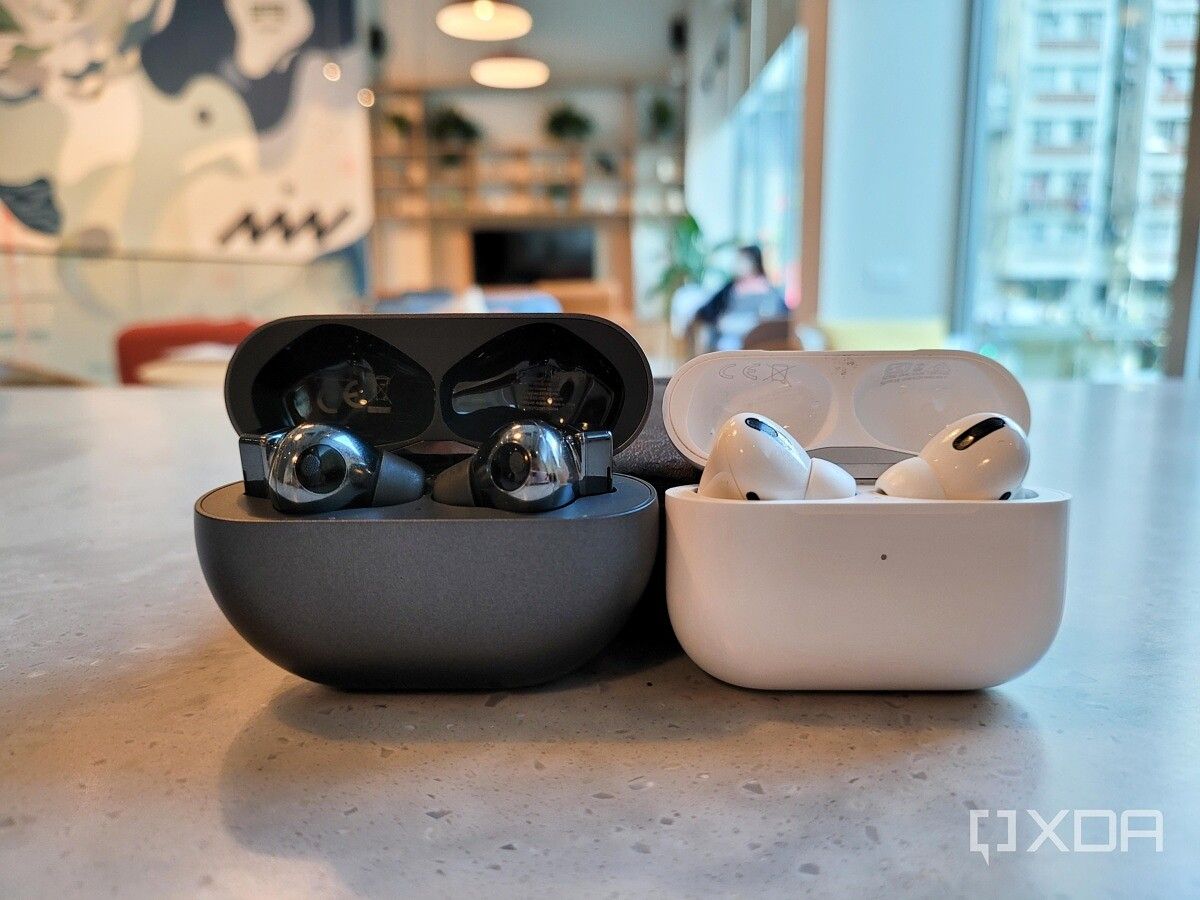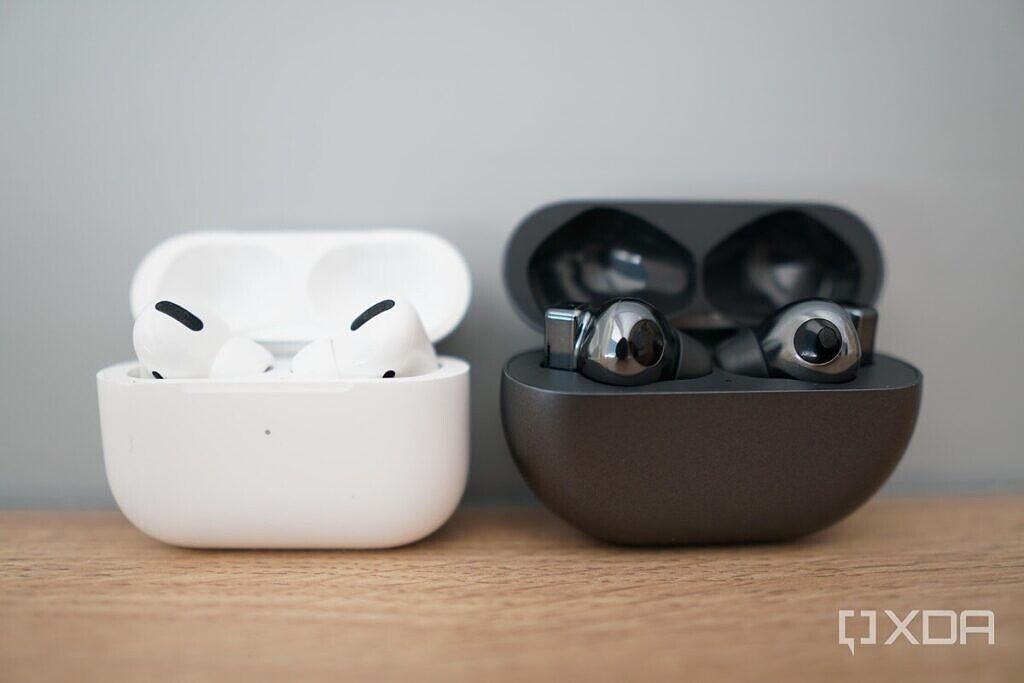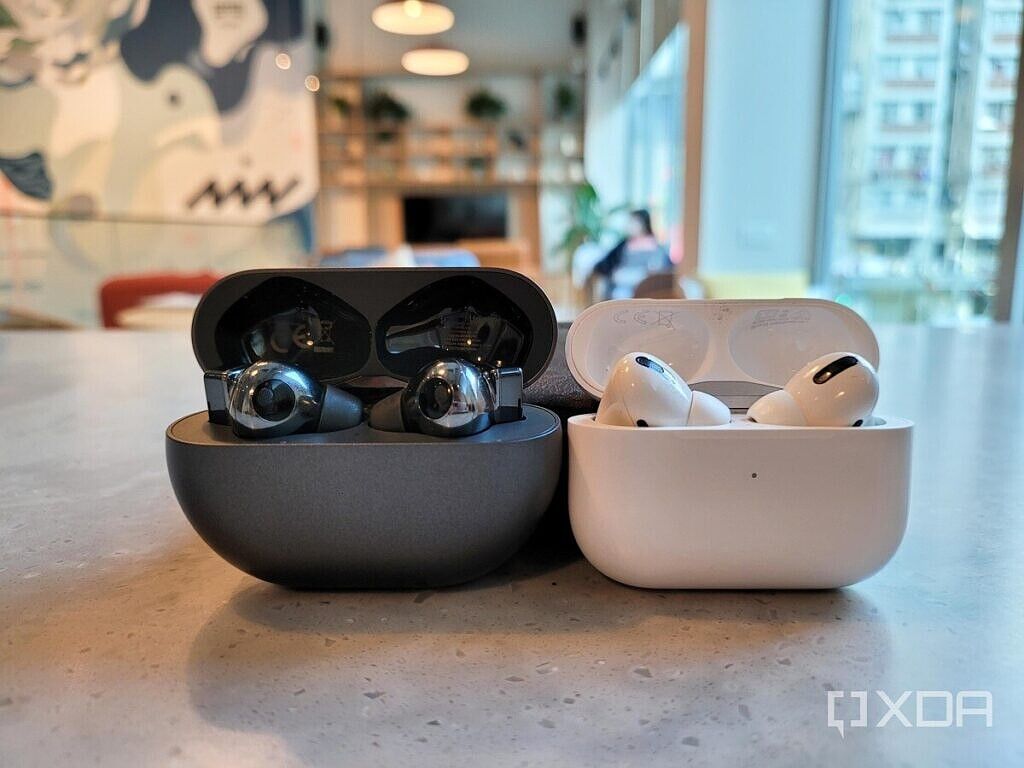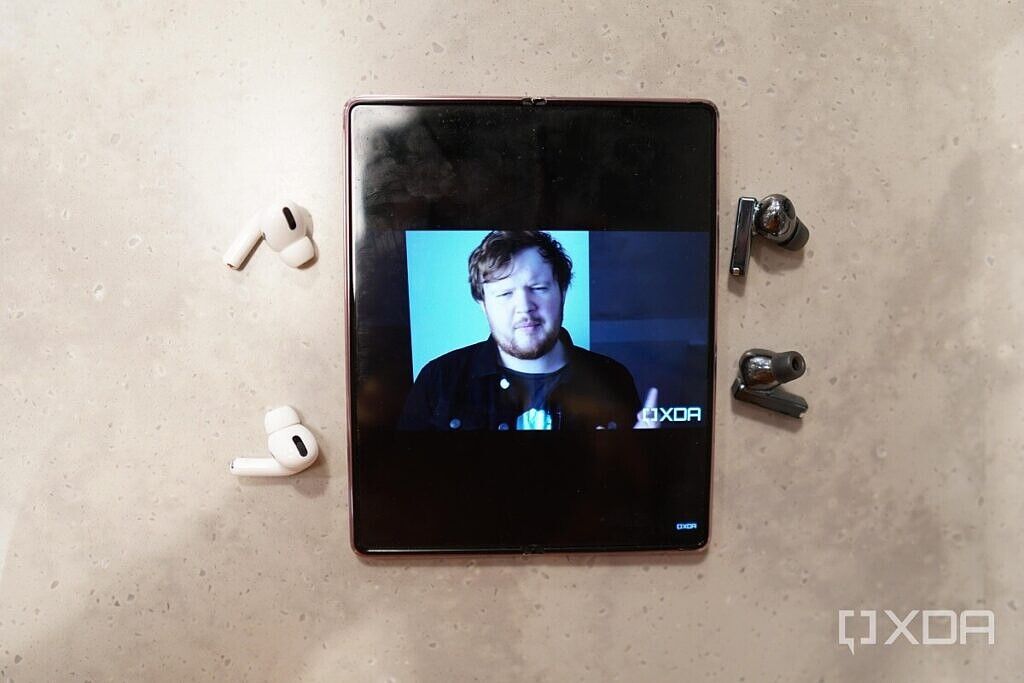While Huawei's smartphone software has been hit and miss over the years, it's undeniable that its smartphone hardware has been top-notch -- arguably the best in the industry. And over the past couple of years, the Chinese tech giant has focused on bringing that same hardware prowess to other consumer products as part of the company's "1+8+N" initiative. One of these products is truly wireless earphones. Huawei's released a few of these before, and while they were solid offerings, they lacked the sleek design or full suite of intelligent features like noise cancellation and active transparency mode of Apple's AirPods Pro -- until now, with the Huawei FreeBuds Pro.
Huawei launched these two months ago during the company's developer conference, and they are easily Huawei's best true wireless earbuds ever. My XDA colleague Adam Conway has already expressed his love for it in a review, but I wanted to do a direct comparison against the FreeBuds Pro's most obvious challenger, Apple's AirPods Pro.
Huawei Freebuds Pro vs Apple AirPods Pro: Specification Comparison
|
Specifications |
Huawei FreeBuds Pro |
Apple AirPods Pro |
|---|---|---|
|
Dimensions & weight |
|
|
|
Chip |
|
|
|
Battery & Charging |
|
|
|
Connectivity |
|
|
|
Other Features |
|
|
Design: Look, Fit, and Comfort
This may be a bit unfair to Huawei's design team, but considering that the AirPods Pro hit the market first and AirPods themselves are ubiquitous all around the world, it's hard to describe the FreeBuds Pro as anything other than AirPods-like. The charging cases have a similar shape and open the same way. Huawei's case is slightly heavier and taller, but both are highly portable and can fit into my pant pocket along with wallet and keys without creating an unsightly bulge.
The FreeBuds Pro sport thicker and more squared-off stems than most wireless earbuds on the market. This design allowed Huawei more space to put sensors and drivers, and these are all cutting-edge, top-notch components. On a personal level, I also like that the boxier look (along with the deep grey color of my unit) make the earbuds look distinct from Apple's AirPods. I have not been a fan of the flood of truly wireless earbuds from other phone brands that seem to want to look like AirPod clones.
I'm also a fan of the fact that neither of the stems are too long
Both earbuds have silicone tips that aim to provide a seal around the wearer's ear canal. The tips are easy to remove on both and can be swapped for smaller or larger ones that are included with the packaging. I find both the FreeBuds Pro and AirPods Pro to be a comfortable, secure fit for my ears. I'm also a fan of the fact that neither of the stems are too long. Compared to the non-pro regular AirPods or Huawei's older wireless earbuds, these are far more discreet in my ears. In fact, if you look at me straight on when I'm wearing them, they are hard to notice. You certainly can't say that about other recent wireless earbuds from Xiaomi or Vivo.
Controls
The stems on both earbuds provide pressure-activated touch controls. I love that both require just a bit of force -- as if I'm pressing a button -- instead of just taps like many other true wireless earbuds. Just tapping often results in accidental or unwanted touches, and both the FreeBuds Pro and AirPods Pro are designed so that you're not pressing the buds into your ear -- another problem I've seen from many earbuds. So controlling both of these earbuds needs to be intentional, which is good.
The controls are very similar too: both FreeBuds Pro and AirPods Pro play or pause music with a single press on either stem. Double pressing skips forward a track, while triple pressing rewinds the track. Press and hold to cycle through noise cancellation or transparency mode.
Huawei one ups Apple, however, by providing volume controls too via swiping -- and they work like charm
Huawei one ups Apple, however, by providing volume controls too via swiping -- and they work like charm. You cannot adjust volume directly on the AirPods Pro.
Performance: Audio quality, noise cancellation, transparency
In terms of audio quality, my colleague Adam declared in his review the FreeBuds Pro are the best sounding wireless earbuds he's ever tested. I'm not ready to go that far -- but I do think the FreeBuds Pro are among the very best sounding ones. For my music tastes -- a lot of 90s hip hop (Nas, Dr Dre), 90s California pop rock (Green Day, Blink 182), and classic rock and roll (Beatles, Rolling Stones, David Bowie) -- I generally find the AirPods Pro a bit more balanced, with crisp mids and clear highs. Huawei's FreeBuds Pro seems to emphasize the low end more.
Where the FreeBuds Pro win easily in my opinion is noise cancellation and transparency
Where the FreeBuds Pro win easily in my opinion is noise cancellation and transparency. This is a big statement for me to make because the AirPods Pro had previously been my favorite in this category. And while both the FreeBuds Pro and AirPods Pro can muffle out typical city traffic noises quite well, where the FreeBuds Pro stand alone at the top is its ability to dynamically analyze the environment and adjusts its noise cancellation type accordingly. Huawei calls this "Intelligent Dynamic ANC," and it really works. It can isolate the low humming buzz of an air conditioner or loud talking people in a packed coffee shop.
Conversely, Huawei's intelligent algorithms also can enhance human voices, this is useful for transparency mode. I have tested over a dozen true wireless earbuds, and the FreeBuds Pro are the only ones I can keep wearing with music playing and still conduct a conversation where I can hear the other party clearly.
The AirPods Pro's transparency mode is good, but it not only lets all the sound in but also amplifies the noise level -- so in a very noisy city like Hong Kong, it almost hurts my ears to have transparency mode on in busy places.
Performance: Phone calls, Connectivity, Latency
Connectivity with both earbuds are strong -- they automatically pair to my phone after the first set-up and from there they very rarely suffer audio drops. To be fair, true wireless earbuds generally suffer in vast open spaces because there aren't buildings or walls off which to bounce wireless signal. Ultra-dense Hong Kong is as far from "vast open space" as possible, so neither earbuds are being tested much here in terms of connectivity. From testing, I left my phone (a Galaxy Z Fold 2 for reference) in one end of a co-working space and walked to the other end -- 40 feet away -- and both earbuds kept a stable connection.
For phone calls, the FreeBuds Pro have three mics to the AirPods Pro's two and while I don't know if that's indeed the difference-maker, I can say the FreeBuds Pro consistently sounded better for the other end during voice calls. I have tested this over a dozen calls in various conditions with two different person on the other end. Every time, they told me my voice sounded more clear and less muffled on the FreeBuds Pro.
Both earbuds do an excellent job of reducing latency to the point it's almost hard to notice. I have worn both earbuds for the past several months watching dozens of hours of videos, and very rarely have I ever noticed that a voice isn't syncing with the person's lips.
Additional Features
You won't have to stress when it rains with either the FreeBuds Pro or the AirPods Pro, as they're rated IPX5 and IPX4 respectively. The stronger rating does mean the FreeBuds Pro can sustain stronger splashes of water than the AirPods Pro but it's hard to find an example in real-world usage -- I suppose the FreeBuds Pro has a higher chance of surviving heavy rainstorms? The point is both of these earbuds can't be taken for a swim, but you can wear them in even heavy rain.
The FreeBuds Pro are also more flexible for cross-platform or cross-brand usage. Huawei's buds can connect up to two devices at the same time, and it doesn't matter what device it is -- could be a Sony laptop and a Samsung Galaxy phone, or an iPhone and an iPad. The AirPods Pro, meanwhile, can connect to two devices only if they are iOS devices. Also, AirPods Pro suffered from low volume issues with some Samsung devices, requiring the user to jump into developer options and "disable absolute volume" to fix.
Battery Life
Not surprising for a Huawei product, the FreeBuds Pro have jaw-dropping endurance. On a single charge, Huawei advertises seven hours of audio playback time if the earbuds have both transparency and active noise cancellation off, and five hours with either of those features on. From my testing, those numbers are accurate. The AirPods Pro, meanwhile, can go around five hours on a single charge.
Both earbuds can be charged wirelessly or wired: the FreeBuds Pro take USB-C, while the AirPods Pro take Lightning.
Conclusion: Two wireless audio powerhouses -- but you have to pay the price
I have tested many wireless earbuds over the past couple of years -- especially in 2020 when seemingly every phone brand launched one -- and I can confidently say the FreeBuds Pro and AirPods Pro are the two best overall in terms of having all the features (however, I do have a soft spot for the Samsung Galaxy Buds Live for its unique shape and fit).
But these are also two of the most expensive ones around. The FreeBuds Pro retail at €199 ($235), while the AirPods Pro go for $249. In late 2020, you can find very capable wireless earbuds for under $100. The $90 TicPods ANC offers almost all the features as Huawei's and Apple's earbuds -- noise cancellation, transparency mode -- except they don't work as well, and the earbuds themselves have long, chunky stems.
If you have the money to spend and you want the best in wireless audio tech right now, it makes sense that Apple and Huawei have the two best options. I think the FreeBuds Pro are better overall because it has longer battery life, better transparency mode, and better compatibility across devices and platforms. However, if you are fully immersed in Apple's eco-system, the AirPods bring the ability to summon Siri via voice (you can't trigger any digital assistant with Huawei's buds).
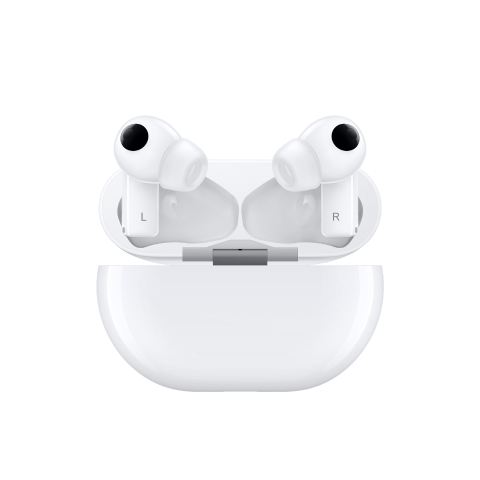
Huawei Freebuds Pro
Huawei's FreeBuds Pro is a major improvement over the company's recent audio offerings, and it even beats the AirPods Pro in many key areas.
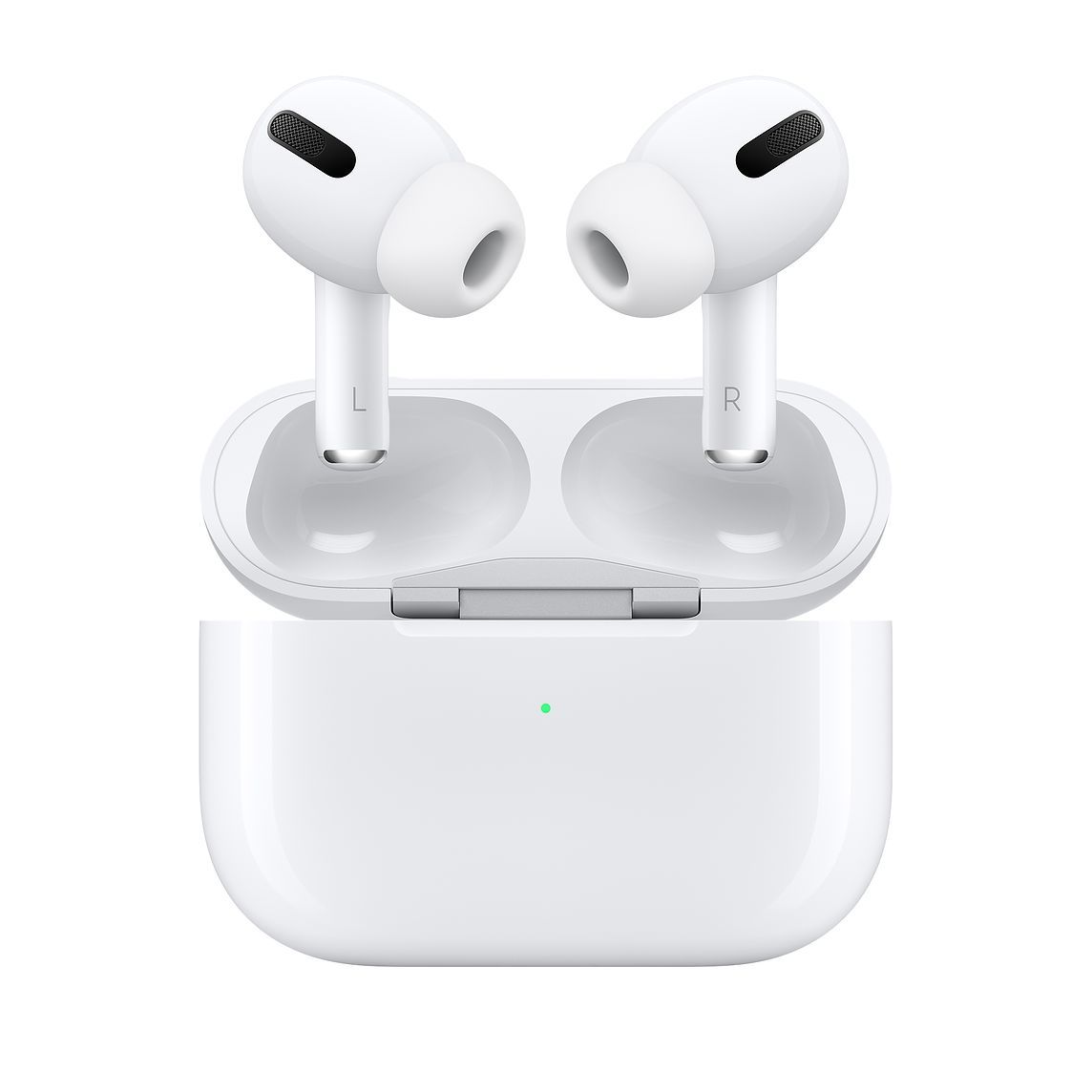
Apple AirPods Pro
The AirPods Pro are ubiquitous for a reason -- they sound great and if you're using an iPhone, MacBook and iPad, the AirPods Pro will fit nicely into the eco-system.
We thank HUAWEI for sponsoring this post. Our sponsors help us pay for the many costs associated with running XDA, including server costs, full time developers, news writers, and much more. While you might see sponsored content (which will always be labeled as such) alongside Portal content, the Portal team is in no way responsible for these posts. Sponsored content, advertising and XDA Depot are managed by a separate team entirely. XDA will never compromise its journalistic integrity by accepting money to write favorably about a company, or alter our opinions or views in any way. Our opinion cannot be bought.

